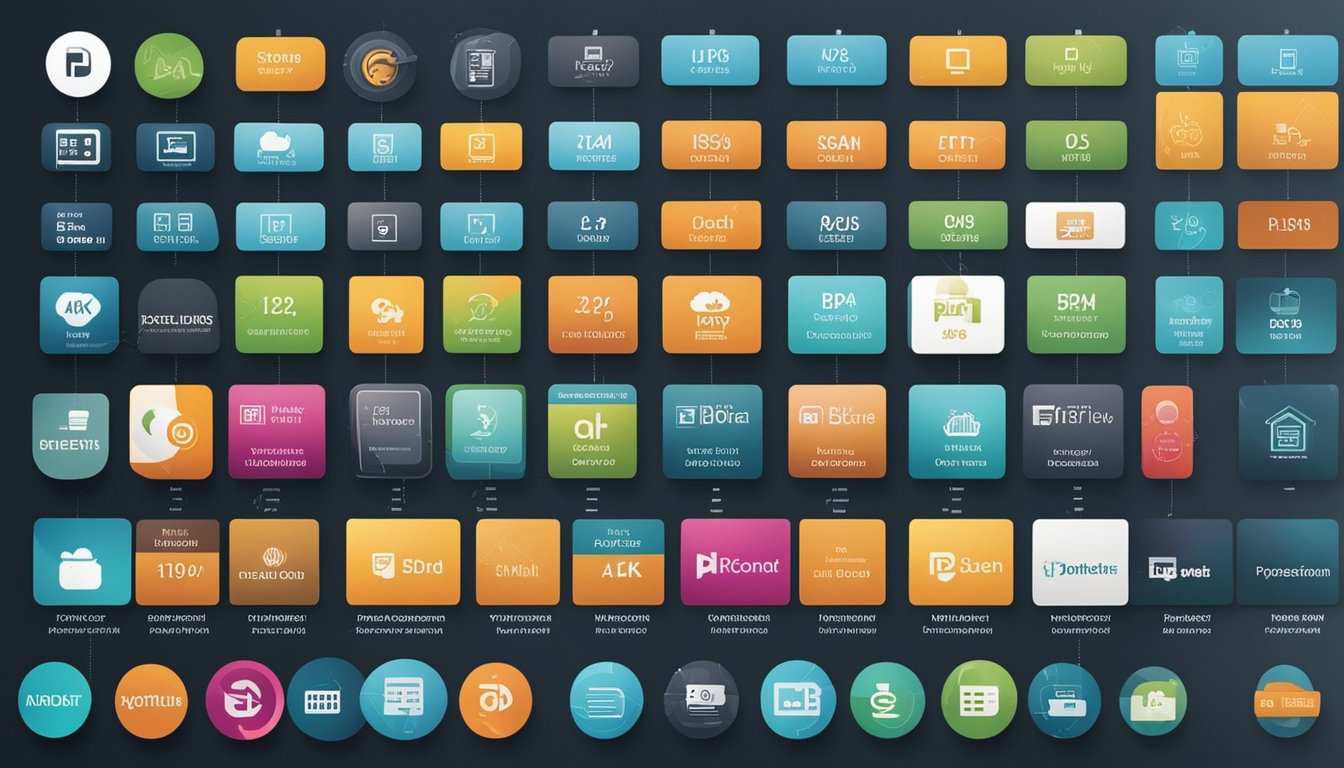Most Popular Mobile App Development Platforms A Comprehensive Guide
Mobile app development is a rapidly growing field, and there are many different platforms available to developers. These platforms offer a range of features and tools to help developers create mobile apps for a variety of devices and operating systems. In this article, I will explore some of the most popular mobile app development platforms and discuss their key features and benefits.

Understanding mobile app development platforms is important for anyone interested in creating mobile applications. A mobile app development platform is a set of tools and technologies used to create mobile apps for various platforms, such as iOS and Android. These platforms provide developers with a range of tools and features, such as app templates, drag-and-drop interfaces, and code libraries, to help them create mobile apps quickly and efficiently.
Popular mobile app development platforms include Xamarin, Flutter, and Appery.io. Each of these platforms has its own unique features and benefits, and choosing the right one for your needs can be a challenge. In the following sections, I will explore these platforms in more detail and discuss their key features and benefits.
Key Takeaways
- Mobile app development platforms are sets of tools and technologies used to create mobile apps for various platforms.
- Popular mobile app development platforms include Xamarin, Flutter, and Appery.io.
- Choosing the right platform for your needs can be a challenge, but understanding the key features and benefits of each platform can help you make an informed decision.
Understanding Mobile App Development Platforms

As a mobile app developer, I understand the importance of choosing the right app development platform. App development platforms are software tools that enable developers to create mobile applications for various operating systems. These platforms provide developers with a single codebase, which can be used to create apps for multiple platforms, including Android, iOS, and Windows.
There are three types of mobile app development platforms: native, hybrid, and web. Native app development platforms are used to create apps for a specific operating system. Hybrid app development platforms can be used to create apps for multiple operating systems using a single codebase. Web app development platforms are used to create mobile web apps that can be accessed through a web browser.
Cross-platform app development platforms are becoming increasingly popular among developers. These platforms allow developers to create apps for multiple operating systems using a single codebase. This saves time and resources, and allows developers to reach a wider audience.
When choosing a mobile app development platform, it is important to consider the programming languages, frameworks, open-source components, and functionality offered by the platform. The platform should also provide a good user experience and user interface, with views, widgets, animations, and integration with other apps.
Testing and debugging are important aspects of mobile app development. The platform should provide tools for testing and debugging the app, and should also provide data storage, security, and APIs. Libraries and components should also be available to make development easier.
Input and navigation are also important aspects of mobile app development. The platform should provide tools for creating intuitive and easy-to-use interfaces for users.
In conclusion, choosing the right mobile app development platform is crucial for the success of any mobile app project. As a developer, I always consider the operating systems, programming languages, frameworks, open-source components, and functionality offered by the platform, as well as the user experience, testing and debugging tools, and input and navigation features when choosing a platform.
Popular Mobile App Development Platforms

As a mobile app developer, I have worked with a variety of platforms that allow me to create applications for different operating systems. Some of the most popular mobile app development platforms that I have used include React Native, Flutter, Ionic, Xamarin, and Cordova.
React Native is a cross-platform app development framework that allows developers to build iOS and Android apps using JavaScript and React. It has become one of the most popular frameworks for creating mobile apps due to its flexibility and ease of use.
Flutter is another cross-platform app development framework that uses the Dart programming language. It allows developers to build high-performance apps for iOS, Android, and the web with a single codebase. Flutter has gained popularity due to its fast development cycle and hot reload feature.
Ionic is a popular open-source framework that allows developers to build hybrid mobile apps using web technologies such as HTML, CSS, and JavaScript. It has a large community of developers and provides a variety of UI components and plugins.
Xamarin is a cross-platform app development framework that uses C# and .NET to build native mobile apps for iOS, Android, and Windows. It allows developers to share code between platforms and provides access to native APIs and features.
Cordova is an open-source platform that allows developers to build hybrid mobile apps using web technologies. It provides a set of plugins that allow developers to access native device features such as the camera, contacts, and geolocation.
Other popular mobile app development platforms include Sencha, Meta, Angular, Unity, Microsoft Visual Studio, Alpha Anywhere, Mendix, Swiftic, and Google's Firebase. Each of these platforms has its own strengths and weaknesses, and the choice of platform depends on the specific needs of the project.
Overall, the choice of mobile app development platform depends on various factors such as the target audience, budget, development team's expertise, and the project's requirements. By choosing the right platform, developers can create high-quality mobile apps that meet the needs of their users.
Choosing the Right Platform for Your Needs

When it comes to mobile app development, choosing the right platform is crucial for the success of your app. There are several factors to consider when selecting a platform, including the type of app you want to build, the target audience, and the features you want to include. In this section, I will discuss some of the key considerations to keep in mind when choosing a mobile app development platform.
Native vs. Hybrid vs. Cross-Platform
One of the first decisions to make is whether to build a native, hybrid, or cross-platform app. Native apps are developed for a specific operating system, such as iOS or Android, using the native programming languages and tools. Hybrid apps are built using web technologies like HTML, CSS, and JavaScript, and then wrapped in a native container. Cross-platform apps use a single codebase to build apps for multiple platforms, such as iOS and Android.
Each approach has its pros and cons. Native apps offer the best user experience and performance, but they can be more expensive and time-consuming to develop. Hybrid and cross-platform apps are more cost-effective and efficient, but they may not offer the same level of functionality and performance as native apps.
User Experience and Interface
The user experience and interface are critical factors in the success of a mobile app. You want to make sure your app is easy to use, visually appealing, and provides a seamless experience for your users. When selecting a mobile app development platform, consider the tools and features it offers for designing and testing user interfaces.
Functionality and Productivity
The functionality and productivity of your app are also important considerations. You want to make sure your app has all the features your users need and that it is efficient and easy to use. Look for mobile app development platforms that offer a wide range of tools and features for building and testing app functionality.
Cost-Effective
Cost is always a consideration when developing a mobile app, especially for businesses. Look for mobile app development platforms that are cost-effective and offer a good return on investment. Cross-platform apps are often more cost-effective than native apps because they use a single codebase to build apps for multiple platforms.
Push Notifications, Loyalty, and Engagement
Push notifications, loyalty programs, and engagement features are essential for keeping your users engaged and loyal to your app. Look for mobile app development platforms that offer tools and features for implementing push notifications, loyalty programs, and other engagement features.
Insights and Knowledge
Finally, look for mobile app development platforms that offer insights and knowledge about your app's performance and user behavior. The ability to track user engagement, retention, and revenue can help you make informed decisions about your app's development and marketing.
In summary, choosing the right mobile app development platform is critical for the success of your app. Consider factors such as native vs. hybrid vs. cross-platform, user experience and interface, functionality and productivity, cost-effectiveness, push notifications, loyalty, and engagement, and insights and knowledge when selecting a platform.
Future Trends in Mobile App Development

As mobile app development continues to evolve, there are several trends that will shape the industry in the coming years. Here are some of the most important trends to keep an eye on:
Cross-Platform App Development
Cross-platform app development is becoming increasingly popular as it allows developers to create a single codebase that can be used across multiple platforms. This means that developers can create apps that work seamlessly on both iOS and Android devices, as well as other platforms. Popular cross-platform app development frameworks include Apache Cordova, Xamarin, and React Native.
Progressive Web Apps
Progressive web apps (PWAs) are web applications that use modern web technologies to provide users with an app-like experience. PWAs can be accessed through a web browser and can be installed on a user's device, making them a popular alternative to traditional mobile apps. PWAs are becoming increasingly important as more users access the internet through their smartphones and tablets.
Cloud Services
Cloud services are becoming increasingly important for mobile app development. Cloud services allow developers to store app data and content on remote servers, making it easier to access and share data across multiple devices. Cloud services also provide a range of other benefits, including scalability, reliability, and security.
Low-Code Development
Low-code development is a trend that is gaining popularity in the mobile app development industry. Low-code development platforms allow developers to create apps without having to write code from scratch. This makes it easier for businesses to create their own apps without having to hire a team of developers.
Third-Party Extensions
Third-party extensions are becoming increasingly important for mobile app development. Third-party extensions allow developers to add new features and functionality to their apps without having to write code from scratch. This makes it easier for developers to create apps that are more feature-rich and user-friendly.
Banking and Payment Integration
Banking and payment integration is becoming increasingly important for mobile app development. With the rise of mobile payments and digital banking, it is essential for developers to integrate banking and payment functionality into their apps. Popular payment platforms include Google Pay and PayPal, while popular banking apps include Chase and Bank of America.
Overall, these trends are shaping the future of mobile app development. As the industry continues to evolve, it is important for developers and app development companies to stay up-to-date with these trends in order to create apps that are both innovative and user-friendly.
Frequently Asked Questions

What are the top 5 mobile app development platforms?
There are many mobile app development platforms available, but the top 5 in 2023 are:
- Flutter
- React Native
- Xamarin
- Ionic
- PhoneGap
Which mobile app development platform is the most popular for iOS?
The most popular mobile app development platform for iOS is currently Flutter. Flutter allows developers to create high-quality, natively compiled iOS apps with a single codebase.
Which mobile app development platform is the most popular for Android?
The most popular mobile app development platform for Android is currently Kotlin. Kotlin is a modern programming language that is fully supported by Google for Android app development.
What is the best platform to develop mobile apps?
The best platform to develop mobile apps depends on your specific needs and requirements. However, Flutter and React Native are two of the most popular platforms for cross-platform app development.
What is the most widely used framework for mobile app development?
The most widely used framework for mobile app development is React Native. React Native is an open-source framework that allows developers to build mobile apps for iOS and Android using JavaScript and React.
What is the most popular programming language for mobile app development?
The most popular programming language for mobile app development is currently Kotlin. Kotlin is a modern programming language that is fully supported by Google for Android app development. However, Swift is also a popular programming language for iOS app development.









